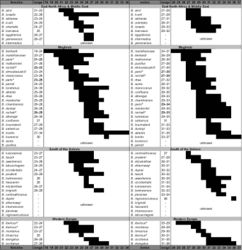Buthus nigrovesiculosus
| Notice: | This page is derived from the original publication listed below, whose author(s) should always be credited. Further contributors may edit and improve the content of this page and, consequently, need to be credited as well (see page history). Any assessment of factual correctness requires a careful review of the original article as well as of subsequent contributions.
If you are uncertain whether your planned contribution is correct or not, we suggest that you use the associated discussion page instead of editing the page directly. This page should be cited as follows (rationale):
Citation formats to copy and paste
BibTeX: @article{Sousa2017ZooKeys, RIS/ Endnote: TY - JOUR Wikipedia/ Citizendium: <ref name="Sousa2017ZooKeys">{{Citation See also the citation download page at the journal. |
Ordo: Scorpiones
Familia: Buthidae
Genus: Buthus
Name
Buthus nigrovesiculosus Hirst, 1925 stat. n. – Wikispecies link – Pensoft Profile
- Buthus europaeus nigrovesiculosus: Hirst 1925[1]: 416.
- Buthus occitanus nigrovesiculosus: Pérez 1974[2]: 22; Fet and Lowe 2000[3]: 96.
Type material
1 M (adult?), 1 juv., syntypes (NHMUK), Boste (approx. 23.79°, -15.68°), Rio de Oro (Western Sahara), now Morocco.
Distribution
known only from the type locality.
Remarks
Hirst identified this North African species as a subspecies of B. occitanus, but as currently circumscribed, B. occitanus does not occur in North Africa (Gantenbein and Largiadèr 2003[4], Sousa et al. 2012[5]). The original description of B. nigrovesiculosus suggests morphological similarities to B. draa and B. tassili Lourenço, 2002. These three species have a dark, almost black, fifth segment of the metasoma (Fig. 14 and 15A, less clear in the male type, obvious in the juvenile, syntypes in the NHMUK). Males of these three species also show slender pedipalp chelae. The type series of B. nigrovesiculosus includes only two animals, and more material is necessary to correctly evaluate the relationship between these three species. Nevertheless the males of B. nigrovesiculosus can be distinguished from males of the other two species by a higher pectinal tooth count (Fig. 10 and 15B, 36 versus <32 in the other two species), and from B. tassili by having a squared first metasomal segment.
Taxon Treatment
- Sousa, P; Arnedo, M; Harris, D; 2017: Updated catalogue and taxonomic notes on the Old-World scorpion genus Buthus Leach, 1815 (Scorpiones, Buthidae) ZooKeys, (686): 15-84. doi
Images
|
Other References
- ↑ Hirst S (1925) XLIII.—On some scorpions from Morocco, with the description of a new genus and species. Annals and Magazine of Natural History 15: 414–416. https://doi.org/10.1080/00222932508633222
- ↑ Pérez S (1974) Un inventario preliminar de los escorpiones de la region Paleartica y claves para la identification de los generos de la region Paleartica Occidental. Cátedra de Artrópodos 7: 1–45.
- ↑ Fet V, Lowe G (2000) Genus Buthus Leach, 1815. In: Fet V Sissom W Lowe G Braunwalder M (Eds) Catalog of the Scorpions of the World (1758-1998). The New York Entomological Society, New York, 91–97.
- ↑ Gantenbein B, Largiadèr C (2003) The phylogeographic importance of the Strait of Gibraltar as a gene flow barrier in terrestrial arthropods: a case study with the scorpion Buthus occitanus as model organism. Molecular Phylogenetics and Evolution 28: 119–130. https://doi.org/10.1016/S1055-7903(03)00031-9
- ↑ Sousa P, Harris D, Froufe E, van der Meijden A (2012) Phylogeographic patterns of Buthus scorpions (Scorpiones: Buthidae) in the Maghreb and South-Western Europe based on CO1 mtDNA sequences. Journal of Zoology 288: 66–75. https://doi.org/10.1111/j.1469-7998.2012.00925.x


